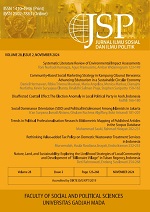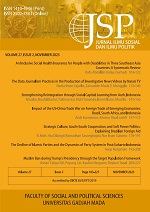The Decline of Islamic Parties and the Dynamics of Party System in Post-Suharto Indonesia
Asep Nurjaman(1*)
(1) University of Muhammadiyah Malang, Indonesia.
(*) Corresponding Author
Abstract
This study aims to investigate the decline of Islamic parties in post-Suharto Indonesia and its correlation with changes in the electoral system. Using a mixed method, data on the post-Suharto election was analyzed quantitatively using the Pedersen formula, supplemented with a qualitative review of scholarly sources, such as journals, books, and proceedings. The results showed that the changing electoral system triggered dynamics in the party system, leading to a decline in the number of votes for incumbent parties, particularly Islamic parties. This decline led to electoral volatility, where voters were more willing to switch their support from one party to another. Moreover, the decline of Islamic partiess’ electoral performance prevailed, as they could not reclaim their positions. This study offers insight into the workings of political party systems in developing democracies, showing how modifications to the electoral process can influence the political environment. These results add to the growing body of knowledge on party systems and electoral politics, not only in Indonesia but also in comparable contexts around the globe.
Keywords
Full Text:
PDFReferences
Al-barbasy, M. M. (2017). Muhammadiyah dan Politik: Dilema Antara Keep Close dan Keep Distance Muhammadiyah and Politics: The Dilemma Between ‘Keep Close’ and ‘Keep Distance.’ 34(2), 99–125.
Al-Hamdi, R. (2021). Ideological cleavage under open-list proportional representation: Parties’ position toward the 2019 Indonesian presidential threshold. Jurnal Ilmu Sosial Dan Ilmu Politik, 24(3). https://doi.org/10.22146/JSP.53514
Aminuddin, M. F. (2017). Electoral System and Party Dimension Assessment in Democratic Indonesia. Jurnal Ilmu Sosial dan Ilmu Politik, 20(1), 1. https://doi.org/10.22146/jsp.17956
Aspinall, E., & Berenschot, W. (2020). Democracy for Sale, Elections, Clientelism, and the State in Indonesia. Cornell University Press.
Barceló, J., & Muraoka, T. (2018). The effect of variance in district magnitude on party system inflation. Electoral Studies, 54. https://doi.org/10.1016/j.electstud.2018.04.016
Barton, G. (2020). Indonesia’s Year of Living Normally: Taking the Long View on Indonesia’s Progress. Southeast Asian Affairs, 20(8), 123–145.
Barton, G., Yilmaz, I., & Morieson, N. (2021). Authoritarianism, democracy, islamic movements and contestations of islamic religious ideas in Indonesia. Religions, 12(8). https://doi.org/10.3390/rel12080641
Baswedan, A. R. (2004a). Political Islam in Indonesia: Present and Future Trajectory. Asian Survey, 44(5), 669–690. https://doi.org/10.1525/as.2004.44.5.669
Baswedan, A. R. (2004b). Sirkulasi Suara dalam Pemilu 2004. Analisis CSIS, 33(2), 173–189.
Bértoa, F. C. (2014). Party systems and cleavage structures revisited: A sociological explanation of party system institutionalization in East Central Europe. Party Politics, 20(1). https://doi.org/10.1177/1354068811436042
Brumberg, D. (2015). Dissonant Politics in Iran and Indonesia. Political Science Quarterly, 124(1), 31–69.
Buehler, M. (2009). Islam and democracy in Indonesia. Insight Turkey, 11(4), 51–63. https://doi.org/10.1017/cbo9781316344446
Chiaramonte, A., & Emanuele, V. (2017). Party system volatility, regeneration and de-institutionalization in Western Europe (1945–2015). Party Politics, 23(4), 376–388. https://doi.org/10.1177/1354068815601330
Dalton, R. J. (2021). Modeling ideological polarization in democratic party systems. Electoral Studies, 72. https://doi.org/10.1016/j.electstud.2021.102346
Damm, M. R. (2018). The (Trans)formation of Religious Capital in Indonesian Politics During New Order Era: A Case Study Of Nahdlatul Ulama. Journal of Indonesian Social Sciences and Humanities, 8(2). https://doi.org/10.14203/jissh.v8i2.96
Dastagir, G., & Ramzy, M. I. (2019). Journal of islamic thought and civilization of the international islamic university malaysia (iium) 2019. 24(1).
Donovan, T., & Karp, J. (2017). Electoral rules, corruption, inequality and evaluations of democracy. European Journal of Political Research, 56(3), 469–486. https://doi.org/10.1111/1475-6765.12188
Döring, H., & Manow, P. (2017). Is Proportional Representation More Favourable to the Left? Electoral Rules and Their Impact on Elections, Parliaments and the Formation of Cabinets. British Journal of Political Science, 47(1), 149–164. https://doi.org/10.1017/S0007123415000290
Fionna, B. U., & Tomsa, D. (2017). Parties and Factions in Indonesia: The Effects of Historical Legacies and Institutional Engineering. In ISEAS Working Paper.
Fionna, B. U. (2016). The trap of pop-charisma for the institutionalization of Indonesia’s post-Suharto parties. Asian Journal of Political Science, 24(1), 124–141. https://doi.org/10.1080/02185377.2015.1136227
Fossati, D. (2019). The Resurgence of Ideology in Indonesia: Political Islam, Aliran and Political Behaviour. Journal of Current Southeast Asian Affairs, 38(2). https://doi.org/10.1177/1868103419868400
Gyene, P. I. (2019). Democracy, Islam and Party System in Indonesia: towards a consensus-oriented model?. PCD Journal, 7(1), 27. https://doi.org/10.22146/pcd.41970
Hanan, D. (2019). Identity Politics in the 2019 Indonesian General Election: Its Significance and Limitation. Journal of Chemical Information and Modeling, 53(9), 1689–1699.
Harahap, H. I. (2019). Islamic political parties in southeast asia: The origin and political problems. Humanities and Social Sciences Reviews, 7(5). https://doi.org/10.18510/ hssr.2019.7555
Hefner, R. W. (2008). Islam in Indonesia, Post- Suharto: The Struggle for the Sunni Center [Review of Defending the Majesty of Islam: Indonesia’s; Indonesian Islam in a New Era: How Women Negotiate Their Muslim Identities; Shari’a and Constitutional Reform in Indonesia; Indonesian Syariah: Defining a National School of Islamic Law, by J. Jahroni, S. Blackburn, B. J. Smith, S. Syamsiyatun, N. Hosen, & M. B. Hooker]. Indonesia, 86, 139–160. http://www.jstor.org/stable/40376463
Hicken, A. D. (2008). Political Engineering and Party Regulation in Southeast Asia. Political Parties in Conflict-Prone Societies: Regulation, Engineering and Democratic Development, 69–94.
Hicken, A., & Kuhonta, E. M. (2014). Party system institutionalization in Asia: Democracies, autocracies, and the shadows of the past. In Party System Institutionalization in Asia: Democracies, Autocracies, and the Shadows of the Past.
Hidjaz, M. K., Mamonto, M. A. W. W., & Buana, A. P. (2020). Legal politics of party simplification in Indonesia: A study based on the political party regulatory model. International Journal of Criminology and Sociology, 9, 1210–1225. https://doi.org/10.6000/1929-4409.2020.09.141
Iqbal, M. (2019). Nahdlatul Ulama Dalam Pusaran Politik: Sebuah Otokriktik Orientasi NU Dalam Politik Perspektif Insider. Jurnal Inovasi Ilmu Sosial Dan Politik, 1(2), 181. https://doi.org/10.33474/jisop.v1i2.4852
Istadiyantha. (2019). Tracing the Path of Islamic Political Movements in Indonesia. Afkaruna, 15(1), 1–14. https://doi.org/10.18196/aiijis.2019.0092.1-13
Kawamura, K. (2013). Presidentialism and Political Parties in Indonesia: Why are All Parties Not Presidentialized? SSRN Electronic Journal, 409. https://doi.org/10.2139/ssrn.2280942
Khairi, H. (2020). Local Elections (Pilkada): Money Politics and Cukong Democracy. Jurnal Bina Praja, 12(2), 249–260. https://doi. org/10.21787/jbp.12.2020.249-260
Kikue, H. (2011). The End of Political Islam? A Comparative Analysis of Religious Parties in the Muslim Democracy of Indonesia. Journal of Current Southeast Asian Affairs, 30(3), 133–159.
King, D. Y. (2003). Half-Hearthed Reform: Electoral Insitution and Struggle for Democracy in Indonesia. In Politik Indonesia: Indonesian Political Science Review. New York: Praeger. https://doi.org/10.15294/jpi.v1i2.6588
Laila, N., Rusydiana, A. S., Irfany, M. I., Imron, H. R., Srisusilawati, P., & Taqi, M. (2021). Energy economics in Islamic countries: A bibliometric review. International Journal of Energy Economics and Policy, 11(2), 88–95. https://doi.org/10.32479/ijeep.10763
Liddle, R William, and Saiful Mujani. 2007. “Leadership, Party, and Religion: Explaining Voting Behavior in Indonesia.” Comparative Political Studies 40(7): 832–857.
Madinier, R. (2020). Confronting Reality: Masyumi and the Exercise of Power. NUS Press Pte Ltd.
Mamonto, Moch. A. W. W. (2019). Legal Politics of Simplifying Political Parties in Indonesia (Case Study of 2004-2014 Election). Substantive Justice International Journal of Law, 2(1). https://doi.org/10.33096/substantivejustice.v2i1.25
Menchik, J. (2019). Moderate Muslims and Democratic Breakdown in Indonesia. Asian Studies Review. https://doi.org/10.1080/10357823.2019.1627286
Mietzner, M. (2015). Critical Asian Studies Dysfunction by Design: Political Finance and Corruption in Indonesia Political Finance Regimes Dysfunction by Design: Political Finance and Corruption in Indonesia. Critical Asian Studies, 47(4), 587–610. https://doi.org/10.1080/14672715.2015.1079991
Mietzner, M. (2008). Comparing Indonesia’s Party Systems of the 1950s and the Post-Suharto Era: From Centrifugal to Centripetal Inter- Party Competition. Journal of Southeast Asian Studies, 39(3), 431–453. http://www.jstor.org/stable/27751535
Moeis, A. I. A., Nachrowi, N. D., Ananta, A., & Widjaja, M. (2020). The politics of district budget formulation in multi-party indonesia. Institutions and Economies, 12(3).
Mujani, S. (2019). Explaining religio-political tolerance among Muslims: Evidence from Indonesia. Studia Islamika, 26(2), 319–351. https://doi.org/10.15408/sdi.v26i2.11237
Mujani, S., & Liddle, R. W. (2004). Indonesia’s Approaching Elections: Politics, Islam, and Public Opinion. Journal of Democracy,15(1), 109–123. https://doi.org/10.1353/jod.2004.0006
Mujani, S., & Liddle, R. W. (2010). Personalities, Parties, and Voters. Journal of Democracy, 21(2), 36–49.
Noor, F. (2012). Institutionalising Islamic political parties in Indonesia: a study of internal fragmentation and cohesion in the Post-Soeharto era (1998-2008). PQDT - UK & Ireland, 1–423.
Novianto, A., & Wulansari, A. D. (2023). Responding to Elite Consolidation: the Anti-Cement-Factory Movement Resisting Oligarchy in an Indonesian Local Election. Jurnal Ilmu Sosial dan Ilmu Politik, 26(3), 298–310. https://doi.org/10.22146/jsp.50591
Nurjaman, A., Suprapto, B., & Masmuh, A. (2018). Nationalist Vs Islamic: The dynamic of politik aliran in post-suharto Indonesia. Pertanika Journal of Social Sciences and Humanities, 26(3), 2009–2020.
Pedersen, M. N. (1990). Electoral Volatility in Western Europe, 1948-1977. In The West European Party System (pp. 195–207).
Prajuli, W. (2018). Islamic Parties, Islamic Radicals and Democratization in Indonesia. May.
Prasojo, Z. H., Elmansyah, E., & Haji Masri, M. S. (2019). Moderate Islam and the Social Construction of Multi-Ethnic Communities. Indonesian Journal of Islam and Muslim Societies, 9(2), 217–239. https:// doi.org/10.18326/ijims.v9i2.217-239
Qodarsasi, U., & Ghofur, A. (2020). The Dynamics of Islamic Political Parties Amid Indonesian Multicultural Society. Politea, 3(1), 35. https://doi.org/10.21043/politea.v3i1.7288
Raharjo Jati, W. (2022). Polarization of Indonesian Society during 2014-2020: Causes and Its Impacts toward Democracy. Jurnal Ilmu Sosial dan Ilmu Politik, 26(2), 152. https://doi. org/10.22146/jsp.66057
Romli, L. (2020). Electoral Power Structure of Islamic Parties in Reform Era Indonesia. Politik Indonesia: Indonesian Political Science Review, 5(2). https://doi.org/10.15294/ipsr.v5i2.22865
Sakai, M., & Fauzia, A.(2014). Islamic orientations in contemporary Indonesia: Islamism on the rise? Asian Ethnicity, 15(1). https://doi.org/10.1080/14631369.2013.784513
Schleiter, P., & Voznaya, A. M. (2014). Party system competitiveness and corruption. Party Politics, 20(5). https ://doi.org/10.1177/1354068812448690
Sebastian, L. C., & Arifianto, A. R. (2020). The 2018 and 2019 Indonesian Elections: Identity Politics and Regional Perspectives. In The 2018 and 2019 Indonesian Elections: Identity Politics and Regional Perspectives. https://doi.org/10.4324/9781003031000
Slater, D. (2013). Indonesia's Accountability Trap: Party Cartels and Presidential Power after Democratic Transition’, Academic Research Library (Vol. 78, Issue 78, pp. 61–92).
Subianto, B. (2020). Party Politics and Democratization in Indonesia: Golkar in the Post-Suharto Era (review). 31(1), 175–177. https://doi.org/10.1355/cs31-1h
Syarif, M. R. (2019). Local Political Parties in Aceh in 2017 Regional Election: Analysis of Political Identity and Islamization Issue. ULUL ALBAB Jurnal Studi Islam, 20(2), 346. https://doi.org/10.18860/ua.v20i2.5668
Tan, P. J. (2005). Parties and Pestas: An Analysis of Indonesian Democratization after the 2004 Elections through the Lens of Party System Institutionalization [1]. 910, 1–37.
Trihartono, A., & Patriadi, H. B. (2016). The 2014 Indonesian general election and beyond: Melting “frozen” cleavages. Asian Journal of Comparative Politics, 1(1), 25–43. https://doi.org/10.1177/2057891115620699
Ufen, A. (2006). Political Parties in Post- Suharto Indonesia: Between Politik Aliran and “Philippinisation.” German Institute of Global and Area Studies, Working Pa (December), 1–35. http://papers.ssrn.com/sol3/papers.cfm?abstract_ id=2123232
Ufen, A. (2007). Political Party and Party System Institutionalisation in Southeast Asia: A Comparison of Indonesia, the Philippines, and Thailand. SSRN Electronic Journal, 44(March). https://doi.org/10.2139/ssrn.978173
Ufen, A. (2008a). From aliran parties to dealignment: political in post-Suharto Indonesia. South East Asia Research, 16(1), 5–41. https://doi.org/10.5367/000000008784108149
Ufen, A. (2008b). The Evolution of Cleavages in the Indonesian Party System. GIGA Working Papers, April(74), 5–24.
Ufen, A., & Mietzner, M. (2015). Political Finance Regimes in Southeast Asia: Introduction. Critical Asian Studies, 47(4), 558–563. https://doi.org/10.1080/14672715.2015.1082260
Warjio, W., Lubis, S., Lubis, Y., & Ananda, F. (2020). Islam and State Ideology: Masyumi’s Experience in Indonesian Politics. https://doi.org/10.4108/eai.12-11-2019.2293551
Weiss, M. L. (2010). Southeast Asia ’ s Muslim Majority Democracies Elections and Islamism outside the MENA Region. Taiwan Journal of Democracy, 6(1), 81–106.
Article Metrics
Refbacks
- There are currently no refbacks.
Copyright (c) 2023 Jurnal Ilmu Sosial dan Ilmu Politik

This work is licensed under a Creative Commons Attribution-ShareAlike 4.0 International License.























